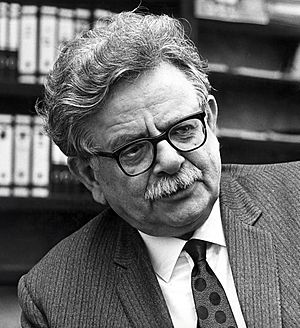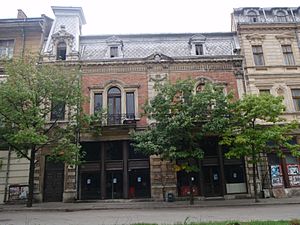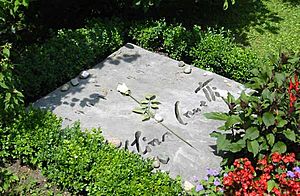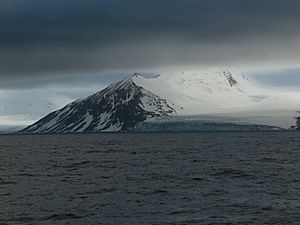Elias Canetti facts for kids
Quick facts for kids
Elias Canetti
|
|
|---|---|
 |
|
| Born | 25 July 1905 Ruse, Bulgaria |
| Died | 14 August 1994 (aged 89) Zürich, Switzerland |
| Occupation | Novelist |
| Language | German |
| Nationality |
|
| Alma mater | University of Vienna (PhD, 1929) |
| Notable awards | Nobel Prize in Literature 1981 |
| Spouse |
Veza Taubner-Calderon
(m. 1934; div. 1963)Hera Buschor
(m. 1971) |
Elias Canetti (born July 25, 1905 – died August 14, 1994) was a famous writer who wrote in German. He was born in Ruse, Bulgaria, into a Sephardic Jewish family. When he was young, his family moved to Manchester, England. Sadly, his father passed away in 1912. After this, his mother took Elias and his two brothers to Europe, and they settled in Vienna.
Canetti moved to England in 1938 to escape the Anschluss (when Nazi Germany took over Austria). He became a British citizen in 1952. He is known for his modern novels, plays, and memoirs. He won the important Nobel Prize in Literature in 1981. This award was given to him for his "broad outlook, a wealth of ideas and artistic power" in his writings. One of his most famous books is Crowds and Power, which is a non-fiction book.
Contents
Life Story and Writings
Early Years
Elias Canetti was born in 1905 in Ruse, Bulgaria. This city is located on the Danube River. His father, Jacques Canetti, was a businessman, and his mother was Mathilde Arditti. Elias was the oldest of three sons. His family were Sephardi Jews, whose ancestors came from Spain.
His family had been successful merchants in Ruse for many years. Canetti's mother's family, the Ardittis, were also a very old Sephardic family in Bulgaria. They had a long history, even serving as doctors and astronomers for kings in Spain centuries ago.

Canetti lived in Ruse until he was six years old. In 1911, his family moved to Manchester, England. There, his father joined a business with his mother's brothers. But in 1912, his father died suddenly. His mother then moved with the children to Lausanne, and later that same year, to Vienna.
They lived in Vienna from the time Canetti was seven. His mother made sure he learned to speak German. Before this, he already spoke Ladino (his first language), Bulgarian, English, and some French. He learned English and French during their year in Britain. Later, the family moved to Zürich (from 1916 to 1921) and then to Frankfurt (until 1924). He finished high school in Frankfurt.
Canetti returned to Vienna in 1924 to study chemistry. However, he became more interested in philosophy and literature. He started writing and joined literary groups in Vienna. He was interested in politics and saw the July Revolt of 1927. He was especially shocked by the burning of books during this event, which he often wrote about later. In 1929, he earned a PhD in chemistry from the University of Vienna, but he never worked as a chemist.
Before moving to Great Britain, he published two works in Vienna. These were Komödie der Eitelkeit (The Comedy of Vanity) in 1934 and Die Blendung (Auto-da-Fé) in 1935. His writings often explored the experiences of Nazi Germany and political chaos. He especially looked at how crowds behave and how people think in groups. He wrote about this in his novel Die Blendung and in his non-fiction book Crowds and Power (1960). He also wrote several memoirs about his childhood and how speaking many languages influenced him.
Personal Life
In 1934, Elias Canetti married Veza Taubner-Calderon in Vienna. She was a great support and inspiration for his writing. In 1938, after Germany took over Austria, the Canettis moved to London.
After Veza passed away in 1963, Canetti married Hera Buschor. They had a daughter named Johanna in 1972. Elias Canetti's brother, Jacques Canetti, lived in Paris and helped bring back French popular songs.
Even though he wrote in German, Canetti lived in Britain until the 1970s. He became a British citizen in 1952. For the last 20 years of his life, Canetti lived mostly in Zürich, Switzerland.
Writing Career
Elias Canetti was a German-language writer. He won the Nobel Prize in Literature in 1981. The prize recognized his "broad outlook, a wealth of ideas and artistic power" in his works. He is best known for his three autobiographical memoirs about his childhood and life in Vienna before World War II. These books are Die Gerettete Zunge (The Tongue Set Free), Die Fackel im Ohr (The Torch in My Ear), and Das Augenspiel (The Play of the Eyes).
He is also famous for his modern novel Auto-da-Fé (originally Die Blendung). Another very important work is Crowds and Power. This book is a deep study of how crowds behave, from mob violence to religious gatherings.
In the 1970s, Canetti started visiting Zurich more often. He eventually settled there and lived in the city for the rest of his life. He passed away in Zurich in 1994.
Awards and Honours
Elias Canetti received many awards for his writing. Here are some of them:
- Prix International (France, 1949)
- Grand Austrian State Prize for Literature (1967)
- Literature Award of the Bavarian Academy of the Fine Arts (1969)
- Austrian Decoration for Science and Art (1972)
- Georg Büchner Prize (German Academy for Language and Literature, 1972)
- German recording prize, for reading "Ohrenzeuge" (Deutscher Schallplattenpreis) (1975)
- Nelly Sachs Prize (1975)
- Gottfried-Keller-Preis (1977)
- Pour le Mérite (1979)
- Johann-Peter-Hebel-Preis (Baden-Württemberg, 1980)
- Nobel Prize in Literature (1981)
- Franz Kafka Prize (1981)
- Grand Merit Cross of the Order of Merit of the Federal Republic of Germany (1983)
He also received honorary doctorates from two universities. One was from the University of Manchester in 1975. The other was from the Ludwig Maximilian University of Munich in 1976.
A place in Antarctica, Canetti Peak on Livingston Island, is named after him.
Main Works
- Komödie der Eitelkeit 1934 (The Comedy of Vanity)
- Die Blendung 1935 (Auto-da-Fé, novel, translated by Cicely Wedgwood in 1946). The first American edition was called The Tower of Babel.
- Die Befristeten 1956 (play, premiered in Oxford in 1956) (Their Days are Numbered)
- Masse und Macht 1960 (Crowds and Power, a study, translated in 1962)
- Aufzeichnungen 1942 – 1948 (1965) (Sketches)
- Die Stimmen von Marrakesch 1968 (The Voices of Marrakesh, travelogue, translated in 1978)
- Der andere Prozess 1969 Kafkas Briefe an Felice (Kafka's Other Trial, translated in 1974).
- Hitler nach Speer (Essay)
- Die Provinz des Menschen Aufzeichnungen 1942 – 1972 (The Human Province, translated in 1978)
- Der Ohrenzeuge. Fünfzig Charaktere 1974 ("Ear Witness: Fifty Characters", translated in 1979).
- Das Gewissen der Worte 1975. Essays (The Conscience of Words)
- Die Gerettete Zunge 1977 (The Tongue Set Free, memoir, translated in 1979)
- Die Fackel im Ohr 1980 Lebensgeschichte 1921 – 1931 (The Torch in My Ear, memoir, translated in 1982)
- Das Augenspiel 1985 Lebensgeschichte 1931 – 1937 (The Play of the Eyes, memoir, translated in 1990)
- Das Geheimherz der Uhr: Aufzeichnungen 1987 (The Secret Heart of the Clock, translated in 1989)
- Die Fliegenpein (The Agony of Flies, 1992)
- Nachträge aus Hampstead (Notes from Hampstead, 1994)
- The Voices of Marrakesh (published after his death, 2001)
- Party im Blitz; Die englischen Jahre 2003 (Party in the Blitz, memoir, published after his death, translated in 2005)
- Aufzeichnungen für Marie-Louise (written 1942, compiled and published after his death, 2005)
See also
 In Spanish: Elias Canetti para niños
In Spanish: Elias Canetti para niños
- Crowd psychology
- List of Nobel laureates by country
- List of refugees
- Marie-Louise von Motesiczky
- Ruth von Mayenburg
 | Jackie Robinson |
 | Jack Johnson |
 | Althea Gibson |
 | Arthur Ashe |
 | Muhammad Ali |



